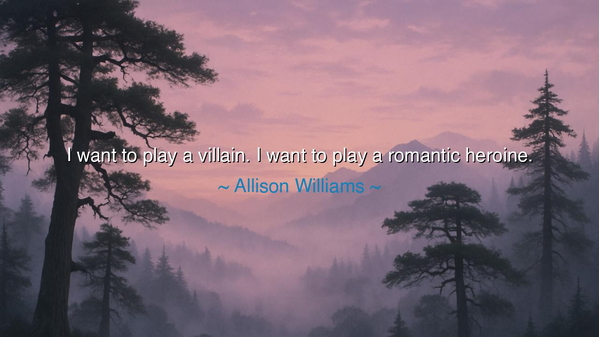
I want to play a villain. I want to play a romantic heroine.






"I want to play a villain. I want to play a romantic heroine." These words spoken by Allison Williams capture the yearning of an artist to explore the full spectrum of human emotion and character. In a world where roles often confine individuals to certain boxes, her desire to embrace both the dark side as a villain and the light as a romantic heroine speaks to the complexity of human nature and the richness of storytelling. To wish to play these two contrasting roles is to acknowledge that we are all capable of both greatness and flaws, and that true artistry lies in the ability to express both sides of the human experience.
The ancient Greeks were masters of duality in their stories. In Greek tragedy, characters were often portrayed with both virtue and vice, illustrating that human nature is not easily defined by a single trait. Sophocles' Antigone, for example, is a woman of noble character, yet her unyielding stance on familial loyalty brings her to tragic ends. Creon, her antagonist, is a ruler who believes in the law above all, yet his stubbornness leads him down a path of suffering and regret. These complex portrayals show that the greatest heroes and villains are often one and the same, bound by their internal conflicts and desires. Just as Williams expresses her desire to explore the full range of human emotion, the ancients understood that both light and dark exist within each of us, and it is through these contrasts that the most powerful stories are told.
Consider the story of Clytemnestra, the queen in Greek mythology, who plays both a heroine and a villain in her tragic tale. After the sacrifice of her daughter Iphigenia, Clytemnestra’s grief and rage drive her to murder her husband, Agamemnon, upon his return from the Trojan War. She is painted as both a wronged wife and a vengeful murderer—her actions a mix of justice and revenge. In this way, Clytemnestra embodies the very essence of what Williams desires: the complex, layered character that inhabits both the light of justified emotion and the darkness of vengeful action. To play such a role is to embrace the human condition in all its contradictions, and in doing so, an actor touches the deepest parts of the audience’s soul.
This idea of embracing both the heroine and the villain is echoed in the story of Shakespeare’s Lady Macbeth, a woman who is at once ambitious, manipulative, and filled with deep guilt. Lady Macbeth is driven by an unwavering desire for power and control, yet her vulnerability and remorse bring her to a tragic end. Williams's wish to play such characters is rooted in the ancient understanding that strength and weakness, good and evil, love and hatred, can exist in the same person, making them all the more relatable and human.
Through these ancient examples, we see that the roles of both the romantic heroine and the villain are essential to understanding the depth of the human condition. In literature, and in life, the greatest characters are those who are not purely good or evil but are instead a mix of both—who navigate the complexities of their emotions and actions. Williams’s desire to embody both roles speaks to a deep understanding of character complexity, acknowledging that to be fully human is to possess a range of attributes that can push us toward greatness or destruction.
The lesson here is that we, too, must embrace the complexity of our own nature. In our lives, we are not bound to a single narrative. We have the power to shape our story, to embody both light and dark, and to understand that it is through our conflict, our mistakes, and our redemptions that we grow. Like Williams, we can seek to understand and express the totality of human emotion, not simply the idealized or the convenient parts of ourselves. In doing so, we can create lives that are as rich and meaningful as the characters we admire.
So, in your own life, strive to embrace complexity. Recognize that you are capable of both good and bad actions, love and anger, passion and disappointment. Be open to the entirety of your emotional and personal journey, and do not shy away from the dark parts of your story. Like Williams, let the contradictions of your character become the source of your strength, and know that in embracing your complexity, you will find a deeper connection with both yourself and the world around you. For it is in the full expression of the human experience that true growth and understanding are found.






AAdministratorAdministrator
Welcome, honored guests. Please leave a comment, we will respond soon